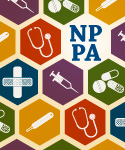October 20th, 2015
I Was Raised on a Zebra Farm
Harrison Reed, PA-C
I was raised on a zebra farm. Maybe you were, too. And while that’s a whimsical place to grow up, it doesn’t reflect the real world.
Our teachers told us that hoofbeats belonged to horses, but everywhere we went they showed us zebras. Those were the medical stories we wanted to hear anyway, right? The rare and interesting, the curious and obscure. We brushed past the mundane and crowded around the specimens we knew we might never see again.
Our teaching hospital teemed with the unusual. You want to know the first disease I ever saw as a student? Exercise-induced rhabdomyolysis. I aced the diagnosis and stunned my preceptor, but that was dumb luck. ESPN had just published a story about it. You want to know the second disease I saw? Hypokalemic periodic paralysis. No help from SportsCenter on that one.
 Professors and lecturers filed in and out of our classrooms and threw slides up on the walls. They loved photographs of the latest referral case, some patient who had perplexed colleagues far and wide and finally traveled to our famous hospital as a last resort. Somewhere in a cramped office, a student or a resident sat at a keyboard turning that poor person into a case study.
Professors and lecturers filed in and out of our classrooms and threw slides up on the walls. They loved photographs of the latest referral case, some patient who had perplexed colleagues far and wide and finally traveled to our famous hospital as a last resort. Somewhere in a cramped office, a student or a resident sat at a keyboard turning that poor person into a case study.
Sure, common things are common, but we could read about those in our common textbooks. We paid good money to learn from the best.
Before graduation I made one last attempt to tiptoe outside the magical garden of academia. I traveled to Uganda where, surely, medicine would rely on its most basic pillars. But the wards there were filled with tuberculosis, leprosy, Ebola, and tetanus (the body-locking, jaw-clenching horror I had only seen in that terrifying Charles Bell painting). These diseases were less bread-and-butter and more biblical plague.
And I wouldn’t have traded the experience for anything.
The zebras didn’t go away after graduation. The first hospital to hire me was a quaternary care center. I guess that meant it was a referral hospital’s referral hospital. I didn’t even know that was a thing.
Our ICU housed an assortment of rare lung diseases and exotic bacteria. Our DKA came packaged with thyroid storm, two-for-one. On one of my first consult shifts, I found two pheochromocytomas in the same day. I should have bought a lottery ticket.
But I eventually left the farm. I moved to a city where the population dwarfed the medical resources, where any true academic medical center was hours away, where the specialists didn’t wait with legions of trainees ready to snatch up even the most timid referrals.
And I was blindsided.
Here, in the real world, the occasional clever diagnosis won’t make you a great clinician. The problem isn’t a perplexing presentation or rare pathology. It’s diabetes and drug addiction and the crushing mass of a population more concerned with survival than health — one that doesn’t see a correlation between the two.
The zebras are gone. The world is overrun with horses.
I could be jealous of those back on the zebra farms. But perhaps that makes me part of the problem. Years ago, didn’t I write an admissions essay about how the lure of medicine was service to those who needed it the most? How the only way to create a better world was to roll up our sleeves and do the work that others wouldn’t?
Maybe it was naive to think the right path would be the most appealing one. Maybe we only like to pretend our careers are more selfless than stimulating. Or maybe that kid clinician just lost his focus along the way, mesmerized by all of those pretty stripes.
I miss it sometimes, that little tickle of excitement, the glamour and thrill of the cutting edge. And I guess the lure of the zebras will always be there.
Meanwhile, the world will still be full of horses. And I will still chase hoofbeats wherever they lead.



Thank you for this post! Much of it resonated with me. One thing that is still exciting amidst the addiction and diabetes are the new/creative/progressive ways of providing care to this patient population. So you can be still cutting edge : )
Margot,
Thank you for reading. I hope that the common but important issues draw as much energy, discussion, and ultimate solutions as some of the more enthralling topics. Dedication and effort stems from interest and passion, something we need to cultivate in these areas.
Harrison
Well written. Great lead off.
Scott, one of your co-bloggers
Good read! Good to see nejm spotlighting the PA profession!
Hi Harrison,
My chief forwarded us this link. I was quite pleased to see your name. I enjoyed the article and echo your sentiment.
Hope you are well, Kim
Very well written, PA Reed. I empathize tremendously with your story. Quite thrilled to see you featured in NEJM.
Wonderful first post! I can’t wait for more to come. Many of us are raised/trained on zebra farms, university hospitals, tertiary facilities. The reality is, most NP/PA’s don’t stay there. They go out into community based practices, urban or rural medicine. Thank you for highlighting how we as NP/PAs need to help our society improve overall daily health whether it be dx and managing diabetes, obesity, hypertension, cancer etc. We play an integral role in empowering patients, supporting patients and affirming a disease does not define them.
Harrison!
Welcome to primary care! I have spent 11 years in PC in underserved and rural areas. When you are there long enough you will see plenty of zebras. I’ve found a few myself each year in practice. PA education prepared you for both.
Now back I go to diabetes, hypertension, drug and alcohol addiction, COPD, asthma, heart failure, bronchitis, depression, and the list goes on and on.
Practicing medicine is an art and science and I love it.
Loved your blog, too!!!
I really enjoyed reading this mostly because it is true but also because it reflects the reality a lot of us go through while we are learning. Of course we need to see the mysterious cases but what we (and the majority of our patients) need the most is for us to be ready for those daily cases too.
Outstanding content – and so refreshing to see a science person who is also a great writer. Keep ’em coming, Harrison!!
I remember those days!! Thanks for the nostalgia – I too am working in the (mundane) of Primary Care – though I really love the challenge of helping people connect-the-dots lifestyle to disease…Light bulbs flashing are fun too!
Good work. I guess the lesson is, factor in the probabilities when making your assessment, but don’t let the oddball diagnoses fall entirely off your radar.
Good article, Harrison!
A very honest and clearly articulated perspective. Accurate and relatable!
I have never read your work before but will keep an eye out after having read this.
I especially liked this statement:
“Here, in the real world, the occasional clever diagnosis won’t make you a great clinician. The problem isn’t a perplexing presentation or rare pathology. It’s diabetes and drug addiction and the crushing mass of a population more concerned with survival than health — one that doesn’t see a correlation between the two.”
-That phrase sums it up quite well.
Nice job Harrison! I had much the same experience during my infectious dz and ICU rotations as a student. Nice that most of it stuck for the days a zebra migrates into the corral.
Eric Holden, PA, DHSc
Great post, Harrison! I am not a PA or an NP or even an RN. I am just regular human. I also write about science and medicine. This is a terrific idea on the part of NEJM and a wonderful first post. Those of us on the outside are both very interested and concerned to learn more about what it’s like for those you on the inside. What you do is so very noble.
I was lucky to have trained in a place that was very community-oriented, and really focused on horses and social issues, but as a curious person, I still tend to consider zebras perhaps more often than I should (although it did help me identify a pheochromocytoma of my own when I was a student!). In a way, becoming familiar with the subtleties and shades of the horses can be just as rewarding, as can helping patients navigate the social issues that prevent them from finding their way to optimal health.